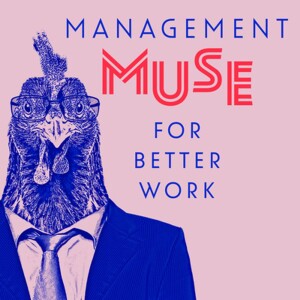
Tuesday May 03, 2022
EP9 Incentives: Dodging Carrots
Organizational incentives are tricky, in at least eight counterproductive ways. This episode of Management Muse is inspired by "On the Folly of Rewarding A, While Hoping for B," a timeless article written by Steven Kerr in the 1970s, this episode provides eight classic examples of incentives that frequently are either misplaced, distorted or internally inconsistent:
- Demanding teamwork but rewarding individual achievement.
- Valuing diversity but continuing to hire the same types of people.
- Encouraging merit and excellence, but doling out paltry, across-the-board increases that reward no one.
- Rallying employees to show customer love, but internally communicating dismissiveness or disrespect towards those very same customers.
- Asking for innovation and experimentation but executing on trusted old ideas.
- Claiming to value women in the workplace, but perpetuating schedules and policies that disadvantage them.
- Asking for loyalty to the organization, but rewarding free agency.
- Asking for candid feedback but responding much more positively to butt-kissing.
In this episode, Cindi and Geoff offer thoughts for anyone who has ever been confused by mixed organizational messages.
Episode Highlights:
· Organizations don’t mean to be contradictory, but incentives are so tricky they often tie well-meaning managers in knots.
· Managerial goals don’t always correlate with desired outcomes.
· Data analytics can be a double-edged sword, as goals and measures may alienate the very employees they’re designed to help.
· Employee evaluations are often skewed by co-mingled rewards and flawed productivity measures.
· Feedback and introspection can often illuminate inconsistent corporate incentives.
Timestamps:
[03:15] Measuring outcomes is often hard because managers want teamwork, but reward individual achievement.
[06:45] Managers often wrestle with: how to encourage better teamwork, elicit more creativity, enhance productivity, compensate people, and when and how to administer discipline.
[11:48] Cindi and Geoff discuss safe hires vs. hard hires, and why the distinction matters.
[24:10] Employee evaluations are often based on flawed formulas.
[38:02] How to unwind workplace incentives that unintentionally penalize women.
[42:59] Corporate leadership praises the idea of candor and people speaking up, until they say something unfavorable.
[49:28] Historical examples emphasize how incentives often go wrong, and how to get them right.
Episode Quotes:
"Organizations commonly say they want teamwork, but all of their reward systems and how they pay out and how they give praise are built on individual achievement.” – Geoffrey Tumlin
“Incentives are tricky. We have to get out of the mindset that we’re going to set up incentives and then just let it go because you have to swing back around (to look at) all the unintended consequences.” – Cindi Baldi
Episode Resources:
· https://www.ou.edu/russell/UGcomp/Kerr.pdf
· Ryan, Richard M., and Edward L. Deci. "When paradigms clash: Comments on Cameron and Pierce’s claim that rewards do not undermine intrinsic motivation." Review of educational research 66.1 (1996): 33-38.
· Cameron, Judy. "Negative effects of reward on intrinsic motivation—A limited phenomenon: Comment on Deci, Koestner, and Ryan (2001)." Review of educational research 71.1 (2001): 29-42. · https://www.gallup.com/workplace/249332/harm-good-truth-performance-reviews.aspx
No comments yet. Be the first to say something!